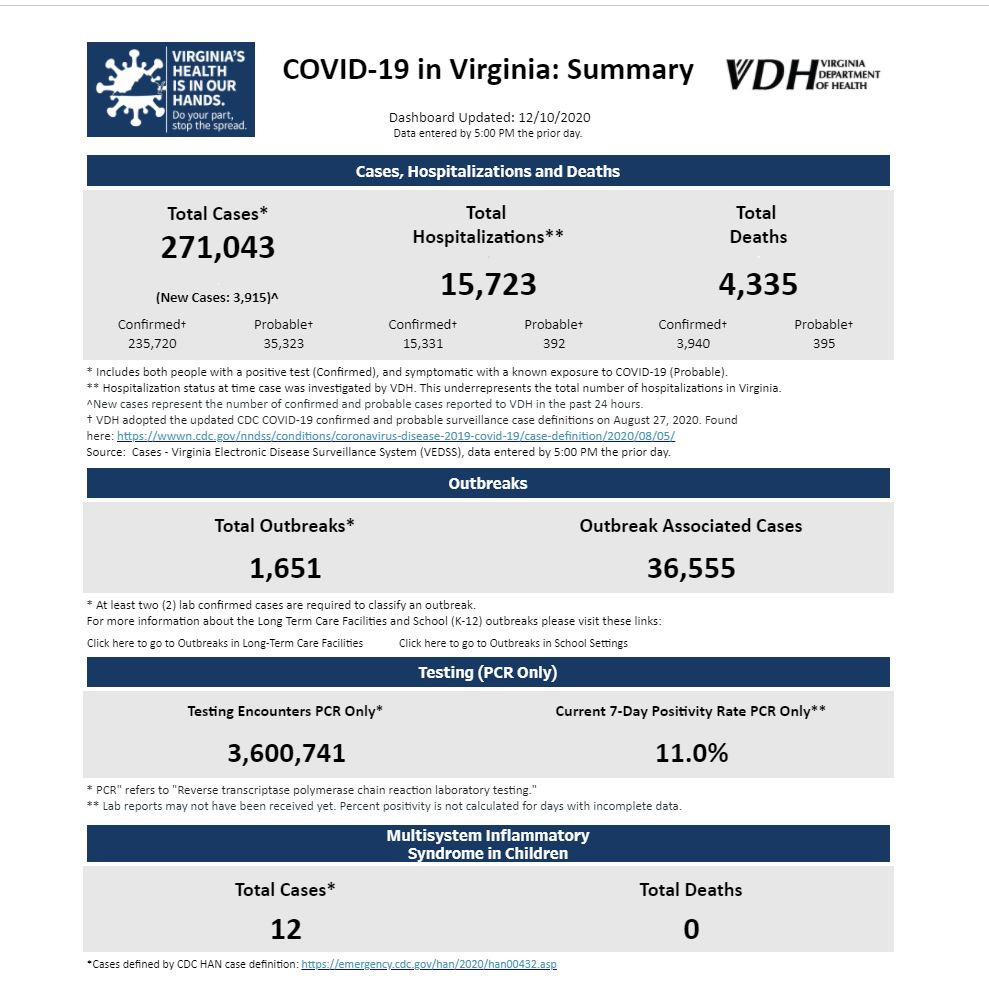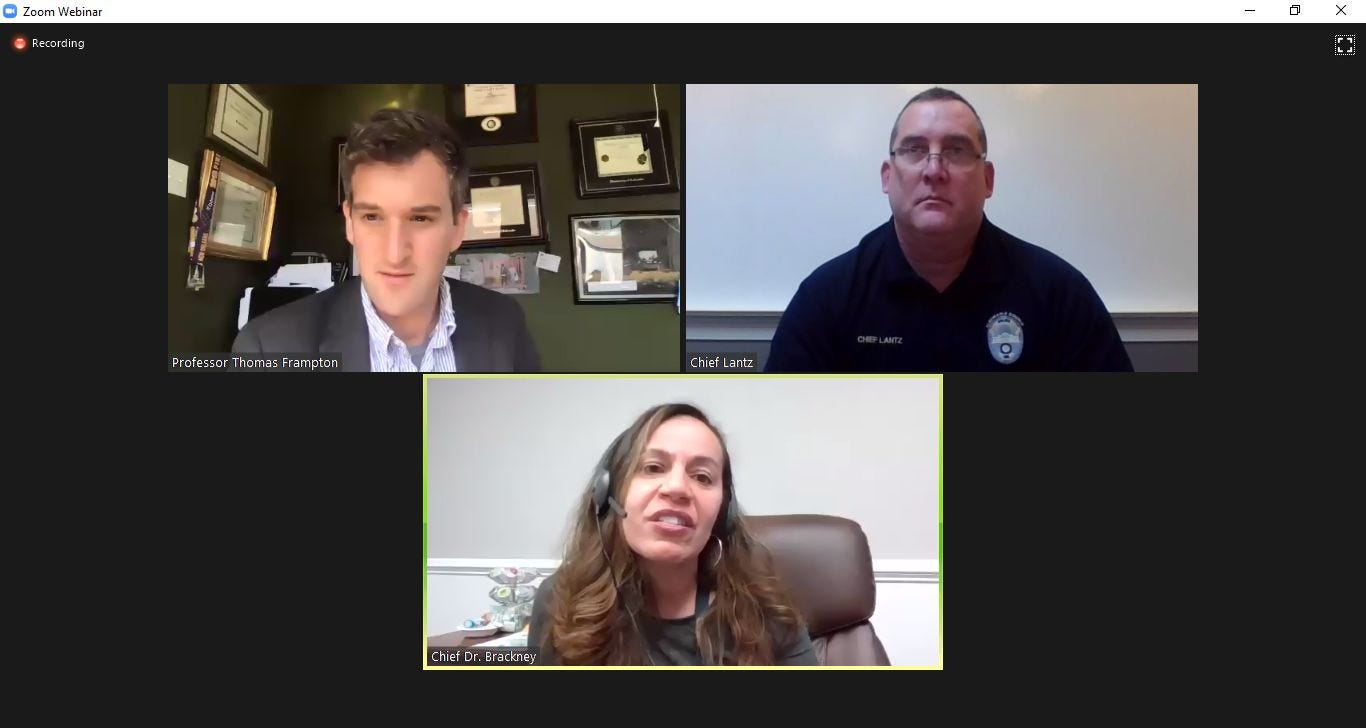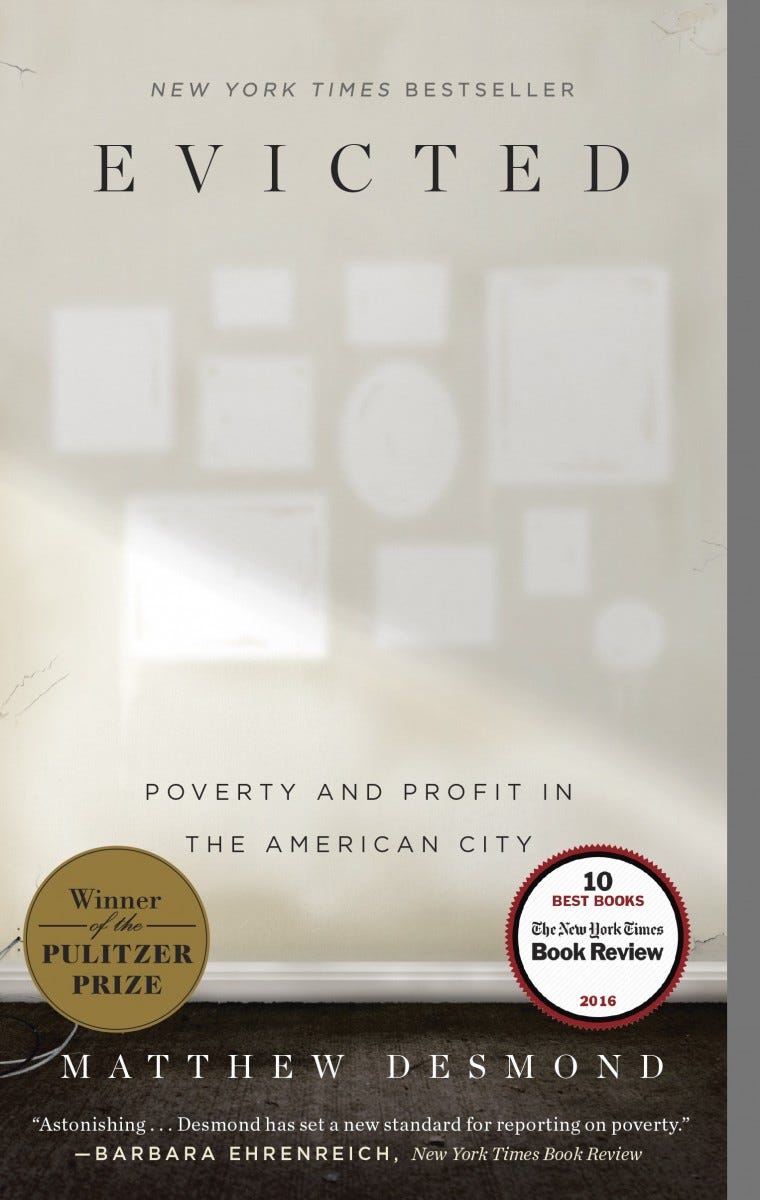In today’s Patreon fueled shout-out: The Local Energy Alliance Program, your local energy nonprofit, wants to help you lower your energy bills, make your home more comfortable, and save energy. Schedule your Home Energy Check-Up to get started - now only $45 for City of Charlottesville and Albemarle County residents. You’ll receive energy-saving products and expert advice customized to your needs. Sign up today!
On today’s show:
Albemarle and Charlottesville’s police chiefs talk community policing
Author Matthew Desmond talks about how to deal with evictions
More from Albemarle’s county’s housing discussion
Brad Sheffield leaves Jaunt
The Virginia Department of Health reports another 3,915 cases of COVID-19 this morning, and the seven-day average of positive test results is now 11 percent, up from 10.9 percent yesterday. To address the matter, Governor Ralph Northam will hold a press conference today at 2 p.m. to further discuss the worsening numbers.
There have been two new deaths reported in the Blue Ridge Health District, with one fatality in Albemarle and one in Louisa. The total count is 84 deaths, and that’s out of 4,335 statewide since March.
The seven-day average for new cases is now at 85 in the district, which reported 97 cases today. That includes 42 from Albemarle, 23 from Fluvanna and 17 from Louisa.
As Charlottesville and Albemarle look forward to next year’s elections, one theme will be the role of policing in the community. The Senior Statesmen of Virginia invited the police chiefs in both jurisdictions to talk about the role law enforcement plays. Ron Lantz has been Albemarle’s chief since 2016.
“We went into this thing called geographic based community policing in 2012 when I came here from Fairfax County,” Lantz said. “We divided the entire county, 726 square miles, into two districts. We assigned officers to the same beat so they work the same area every night so they get to know the community, they get to know the business owners.”
Lantz said calls for service initially went up, on the idea that people would be more willing to reach out when they need assistance.
“Since the initial phase, our crime has gone down, our violent crime is down some 30 percent in the last three years,” Lantz said. “The other thing it has done is reduce response times in the county because the officers get to know the same area where they are working.”
RaShall Brackney has been police chief in Charlottesville since the summer of 2018, when she replaced Al Thomas who resigned in the wake of the August 12 Unite the Right Rally. Brackney said for her, community policing is about building relationships to help build trust.
“So for me, I’ve been able to move away from the buzzword so that we don’t find ourselves sitting in a space that we can never get out of as we debate what the language means and the definition means,” Brackney said, adding that trusting relationships would eventually lead to the type of police services the community wants and needs.
“The challenge around all of these is that we’ve not come around with certain metrics that are uniform across the nation to determine whether or not we’re being successful,” Brackney said. “So the departments are often forced to create their own measures for success like Chief Lantz said. That may be an increase in 911 calls or a decrease in internal affairs or complaints about the community about engagement about rudeness, discourtesy, etcetera.”
The forum was moderated by Thomas Frampton, an associate professor at the University of Virginia School of law. He phrased this question.
“Across the country, there has been a lot of talk and discussion about whether or not police have been given too many tasks or obligations to perform in addition to their main role of keeping the community safe or maybe as part of their role, but that there might be better entities or personnel that can to address some of those tasks or obligations. Have you encountered that? Do you think that’s fair to say about your own departments?”
Thompson also asked if it was fair to suggest that police budgets be cut to their budgets and to reallocate financial resources to areas such as mental health services. Brackney responded that her department responds to all manner of calls, from loitering to welfare checks. .
“So what’s interesting in society is this,” Brackney said. “We identify a problem and then ask the same entities to find a solution to the problem. So you just even said it yourself, professor. Should the police do this and should their budgets be cut in order to fund the new thing, right? So I have to identify the problem and then create the solution. Which puts it right back into the policing entity again to handle whatever those societal ills are. So, yes, they have been called to do many things, and we have the 911 bucket. When we used to say, don’t put all of your eggs into one basket? We put all of our 911 calls in one bucket and one basket and not increased their budgets to do that.”
Chief Lantz said he has been hearing the call to “defund the police” for the past several months.
“Here in Albemarle County, I actually track the mental health calls for service each month that my officers go to because that’s a piece of time that they’re spending on each call, and we’re averaging 70 a month just in Albemarle County,” Lantz said. “I don’t know if Chief Brackney tracks those but we do. And what we’re finding is that officers spend anywhere from two hours to 25 hours on those. We had one that was 25 hours. That’s no joke. So what we’ve started to do and we’re in the infant stage and it’s going to be mandated to us like Chief Brackney said, there are several things that we’re required to do, but one of the things that’s coming down the pike in the next two years is we are going to have to have a team that has a police officer, social services. We have to have a policy in place where they go out to some of these mental health calls for service as a team approach and not just the officer being primary.”
Lantz said Albemarle is working with Region 10 and Albemarle County’s Commonwealth Attorney to find ways, but added that taking away from his department’s budget would affect staffing abilities. He said the pandemic and the need to reduce human contact has lead to more situations being able to be resolved over the phone. Being able to file a police report online is also cited as a benefit.
“The less interactions you have with a police officer, the less likely to have a negative outcome,” Brackney said, adding that the presence of police officers can increase tensions. “Partly what we need to do is resocialize the community and change the community’s culture and expectations of what does policing looks like and how do we renegotiate the social contract to get us to the place where policing is reformed in a way that it’s more high-priority, high-level public safety then it is often with social ills and quality of life calls that we don’t have the ability to impact.”
The full recording will be on the Charlottesville Podcasting Network later this week.
*
All across the country, there are Americans worried about whether they will be able to pay their rent or mortgage, and if not, they are concerned they will end up homeless. Last night, the Virginia Festival of the Book hosted Matthew Desmond, a professor of sociology at Princeton University and the author of Evicted: Poverty and Profit in the American City. Jane Kulow is the director of the Festival.
“In Evicted, Matthew Desmond follows eight families in Milwaukee as they each struggle to keep a roof over their heads and he uses a combination of stories and data to transform our understanding of poverty and economic exploitation while providing fresh ideas on how to solve one of the 21st Century America’s most devastating problems,” Kulow said.
Desmond said the United States of America has a unique distinction and he began his research by moving into a mobile home park.
“It’s the richest country with the worst poverty, and that’s always troubled me,” Desmond said. “And I know it troubles so many of you. And I wanted to understand the role that housing plays in that story and I thought that looking at evictions, looking at families physically and forcible removed from our homes was a good way of about going about that work.”
Desmond also lived in an inner city rooming house on the north side of Milwaukee. In both experiences, he followed the stories of people being evicted.
“And I knew that to understand how the housing market worked, I needed to just as close to landlords that are doing the evicting as I did the tenants getting evicted, and so I did, and I went to eviction court with landlords, too,” Desmond said.
Desmond has also worked on an interactive website to track evictions called the Eviction Lab. He said rents have doubled over the last two decades but incomes have not kept up. At the same time, government assistance has also not increased.
“So, these are the three ingredients that lead us and push so many families right up to the knife’s edge of eviction,” Desmond said.
Nationwide, 3.7 million eviction notices are issued each year. He said they are a sign of an unhealthy society.
“They are not just a condition of poverty, eviction is also a cause of poverty,” Desmond said. “It’s making things worse and it’s leaving a deep and jagged scar on the next generation so if we want to get serious about addressing inequality in this country and spurring mobility and making our society fair, then we have to address the affordable housing crisis. Without stable shelter, everything else falls apart.”
Desmond said one step that can be taken is the hiring of more attorneys to help people fight eviction notices. Nationwide, the Centers for Disease Control has enacted a temporary moratorium on evictions. In Virginia, a budget amendment signed by Governor Northam in November requires landlords to refer tenants to the state’s Rental and Mortgage Relief program. The statewide moratorium ends on December 1.
You can watch Desmond’s conversation on YouTube.
*
Albemarle’s Board of Supervisors discussed a new housing plan with the Albemarle Planning Commission Tuesday night. The first objective in the draft is a statement that the county needs to build 3,616 more homes than allowed under existing zoning. Albemarle only allows dense development in about five percent of its 726 square miles. Commissioner Karen Firehock brought up the topic.
“I’m concerned about our willingness to approve higher density affordable developments within the urban ring,” Firehock said. “There have been several that have been turned down and if we are indeed committed to this I think we need to rise above the concerns of some of the neighbors who come and testify to the Planning Commission that they have their $450,000 house and they don’t think it’s right that someone might live across the street in a $250,000 unit.”
Commissioner Julian Bivins suggested that the Supervisors could consider adding more land to the growth area in part to support the county’s economic development efforts.
“That would allow the county to say that if we’re going to ask and bring in economic agents here, businesses to this community, how are we also going to bring housing stock here so the full range of employees can in fact live within a reasonable distance?” Bivins asked.
Supervisor Diantha McKeel wanted to know how the plan acknowledged or accommodate the University of Virginia’s statement in March that they would build up to 1,500 affordable housing units.
“They made that announcement in March, but we don’t know that much about it,” McKeel said.
McKeel also suggested the county could use about 50 acres of land Albemarle has access to off of Berkmar Drive Extended to relocate maintenance facilities used by county school buses, and then build housing at the Lambs Lane Campus where Albemarle High School and others are.
“It’s available for us and we need to use that property and it’s in an area where we have population and we have transportation access,” McKeel said.
I’ll have more from this discussion in the next newsletter.
*
The director of the area’s regional transit provider has abruptly resigned from the position. The Daily Progress reports that Brad Sheffield will stop being the Chief Executive Officer of Jaunt effective this past Monday. Sheffield took over the position in 2015 during his one and only term as a member of the Albemarle Board of Supervisors. During his tenure, Jaunt launched commuter routes including one between Crozet and Charlottesville. This past July, they assumed management responsibilities for Greene County Transit. He’ll be replaced in the interim by Karen Davis, the agency’s chief operating officer.
Today in meetings:
Charlottesville City Council holds a budget work session at 6 p.m. (meeting info)
The Albemarle County Conservation Easement Authority meeting begins at 4:45 PM to consider two easement applications (meeting info)
The Places29-Rio Community Advisory Committee will meet at 6 p.m. There is no agenda at publication time. (meeting info)
The Louisa Planning Commission meets at 6 p.m. (meeting info)

















Share this post